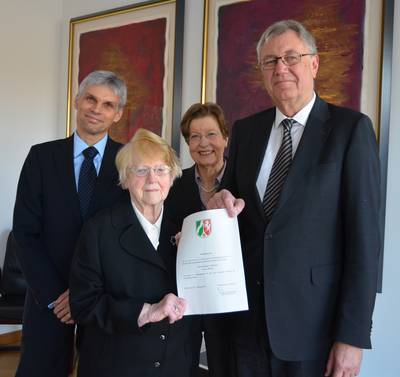

Almuth Klemer was the first woman to habilitate in chemistry at the University of Münster. Grateful for her successful university career, she set up a foundation in her old age to support chemistry students and needy school children.
Almuth Klemer was born on February 12, 1924 in the small town of Bassum in Lower Saxony. Even as a girl, she was interested in science – a passion her parents encouraged. Klemer passed her Abitur in February 1942. Two months later, however, she had to go into labor service for a year. Only then was she able to begin her chemistry studies at the Justus Liebig University in Gießen .
Organized teaching and study activities in Gießen soon became unthinkable. The city was almost completely destroyed by heavy air raids in 1944 and at the end of the war the university was dissolved. In the turmoil of the last days of the war, Klemer managed to return home. In order to secure her livelihood, she first worked in a steel mill. At the same time, she attended the courses offered to those returning from the war to improve their knowledge of physics and mathematics. In the winter semester of 1945/46, she received the long-awaited decision to enroll in the subjects of physics, mathematics and chemistry at the Westfälische Wilhelms-Universität (WWU) in Münster - according to the criteria of the professional supervision for women, however, only for a teaching degree.
Klemer is described by her fellow students as comradely, enthusiastic and a team player. She got along very well with the modest, almost poor equipment in the laboratories and in the evening conversations she convinced her academic teachers of her scientific talent. The professors were soon endorsing her change from teaching to study full chemistry at Münster University. After completing her diploma in 1950, she immediately began her doctoral thesis entitled "On the synthesis of sugar-amino acid compounds and a new process for the preparation of sugar anhydrides". Klemer received his doctorate in 1952. Her supervisor was Fritz Micheel (1900-1982), who headed the Institute for Organic Chemistry at the University of Münster from 1937 to 1968 and played a key role in the reconstruction of organic chemistry in Münster after the war.
From then on, Klemer focused her research on the synthesis and breakdown of sugar molecules. In 1958 she was the first woman to habilitate in chemistry at the University of Münster. She published excerpts from her habilitation thesis under the title "Synthesis of a trisaccharide with a branched structure (4-α,6-β-bis-D-glucosido-D-glucose)". She remained loyal to the University of Münster throughout her life as a researcher: in 1963 she was appointed scientific adviser, a year later adjunct professor and in 1980 finally full professor of organic chemistry. For almost thirty years, until 1986, Klemer taught and researched as a professor at the University of Münster. During this time she supervised 54 doctoral students.
In addition to almost 100 scientific publications, Klemer has authored and co-authored numerous textbooks and research reports on the chemistry of carbohydrates. In addition, she dealt intensively with the position of women in science and wrote a monograph on it that is well worth reading at the end of the 1960s. She got to know the downsides of a life in the service of science herself: she remained unmarried and childless.
In 1970, Klemer was awarded the Order of Merit of the Federal Republic of Germany for her scientific and social commitment. Since 2014 she has been supporting education, science and research in her subject with the Almuth Klemer Foundation, for example by awarding the Almuth Klemer scholarship to chemistry students at the WWU. Klemer also supported needy school children from the district of Göttingen with her private assets. "I am grateful for a successful career that would not have been possible without a scholarship and support from the chemical industry fund," she emphasized. By setting up her foundation, she wanted to give something back: "I think it's important that talent is encouraged through performance incentives."
Almuth Klemer died in November 2022 at the age of 98.

a notice
The texts published in this series do not claim to be scientific publications. Authors and other people involved are not experts in the history of science. The purpose of the series is to introduce the mostly unknown women chemists and to remind you of the well-known women chemists. We encourage readers who want to know more to study academic Literature on the women featured. In some cases there are detailed chemical-historical works.
authors
Prof. Dr. Eberhard Ehlers
Prof. Dr. Heribert Offermanns
Editorial processing
Dr Uta Neubauer
project management
Dr Karin J. Schmitz (GDCh public relations)
The authors are responsible for the content of the biographies.
The content presented on these pages has been carefully compiled. However, the authors, Editorial staff and publishers assume no responsibility or liability for the completeness and correctness of the content or for typographical errors.
This page has been machine translated. If you have any feedback or comments please feel free to contact us. 
last modified: 05.07.2023 17:29 H from Translator